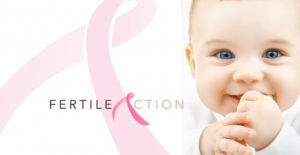The scientists and researchers within the Oncofertility Consortium spend a significant amount of time and effort studying the biological, psychological, and societal aspects of cancer and fertility. Many of the discoveries we make here have the capacity to transform clinical oncology care, reproductive health care practices, and change patient lives…but only if we are able to disseminate the results of this research. For that, we work with the many inspiring cancer advocacy groups around the world. Fertile Action is one such group and it’s founder, Alice Crisci, may be one of the most enthusiastic members of this microcosmos, as we learned at the 2011 Oncofertility Consortium Conference. We recently sat down with Fertile Action for a quick Q & A, which we will post in a two part series. Enjoy!
______________________
 OC: When was Fertile Action founded?
OC: When was Fertile Action founded?
FA: Alice Crisci debuted Fertile Action April 17, 2008, just four days before her double mastectomy when she was a 31-year-old breast cancer patient. Struck by the limited resources available for young women with cancer, and fueled by her personal experience funding her fertility preservation on her American Express card, Crisci vowed to protect the vision women have of their future as mothers when touched by cancer.
OC: What is your primary mission?
FA: Fertile Action helps women touched by cancer become mothers through education, advocacy and financial aid.
- We educate patients, survivors and caregivers on the fertility risk cancer treatment poses as well as the full spectrum of family planning options including fertility preservation, egg, embryo and egg donation, surrogacy, adoption, In vitro fertilization, and natural pregnancy.
- We advocate on behalf of patients and survivors to ensure they receive the most ethical and affordable family planning options possible from their physicians, agencies and insurance company.
- We reduce or eliminate cost as the barrier to becoming a parent through our financial aid program. We have a network of reproductive endocrinologists who donate their fertility services by 55%-100%. We even have a pro bono network of egg freezing specialists across seven states. We also offer egg donation grants and surrogacy grants to offset tens of thousands of dollars associated with third party reproductive technologies.
OC: What are the greatest barriers to fertility preservation for cancer patients?
FA: The greatest barriers to fertility preservation are lack of awareness, as well as exorbitant costs. Only 50% of U.S. oncologists discuss fertility risk or fertility preservation with their patients. The average cost of fertility preservation across the country is $12,000 and up to $20,000 in some markets, a cost insurance companies do not routinely cover.
OC: Do you have any upcoming educational events?
Yes! We are launching a national oncofertility tour in 2012, where we will conduct one-day conferences across the country for adolescent and young adult cancer survivors, their caregivers, oncology professionals, and fertility specialists. We will discuss all family planning options in an informal, comfortable setting as well as offer mini-consults for the survivor community with specialists, third party agencies, reproductive attorneys and more. We will also launch webinars in 2012 as well covering similar topics.
______________
Read the rest of our interview with Fertile Action tomorrow!
Are you a cancer survivor? Help oncofertility researchers study and prevent treatment-induced fertility loss by joining the FIRST online fertility registry for cancer survivors!

